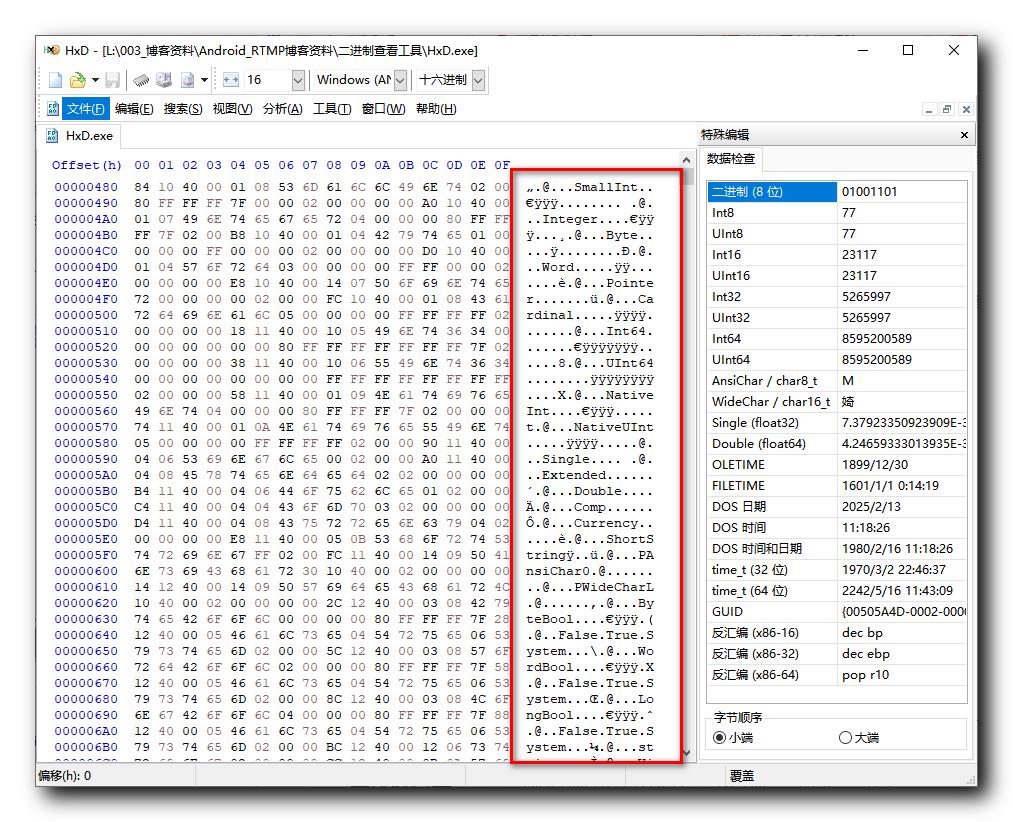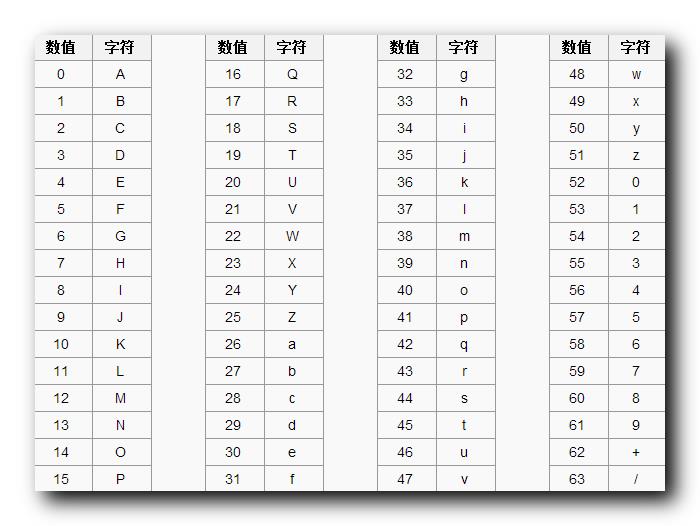密码学Base64 编码 ( Base64 简介 | Base64 编码原理 | 最后编码组字节不足时补位 ‘=‘ 符号 | Base64 编码实现参考 )
Posted 韩曙亮
tags:
篇首语:本文由小常识网(cha138.com)小编为大家整理,主要介绍了密码学Base64 编码 ( Base64 简介 | Base64 编码原理 | 最后编码组字节不足时补位 ‘=‘ 符号 | Base64 编码实现参考 )相关的知识,希望对你有一定的参考价值。
一、Base64 简介
Base64 不是加密算法 , 是一种 可读性算法 , 其目的不是用于保护数据 , 其目的是为了可读性 ;
普通的二进制数据随机性很大 , 使用二进制文件打开后 , 参考下图 , 有很多奇怪的字符 , 都叫不上名称 , 可读性很差 , 也没办法表述出来 ;

使用 Base64 之后 , 其可读性增强很多 , 标准的 Base64 编码只能从下面的字符中选择字符 ;
private static final byte ENCODE[] = {
'A', 'B', 'C', 'D', 'E', 'F', 'G', 'H', 'I', 'J', 'K', 'L', 'M', 'N', 'O', 'P',
'Q', 'R', 'S', 'T', 'U', 'V', 'W', 'X', 'Y', 'Z', 'a', 'b', 'c', 'd', 'e', 'f',
'g', 'h', 'i', 'j', 'k', 'l', 'm', 'n', 'o', 'p', 'q', 'r', 's', 't', 'u', 'v',
'w', 'x', 'y', 'z', '0', '1', '2', '3', '4', '5', '6', '7', '8', '9', '+', '/',
};
Base64 由 64 64 64 个字符组成 , 包括大写 A-Z , 小写 a-z , 数字 0-9 , 两个符号 + 和 / , 上面代码中的 ENCODE 字符数组中的 64 64 64 个字符 ;
比特币中有一种 Base58 编码方式 , 其字符包括大写 A-Z ( 没有 I 字母 ) , 小写 a-z ( 没有 o, i 字母 ) , 数字 1-9 , 没有数字 0 0 0 , 这是因为数字 0 0 0 与字母 o 不好区分 , 此外没有 + 和 / 符号 ;
Base58 编码比 Base64 少了 数字 0 0 0 , 小写字母 i, o, 大写字母 I , 两个符号 + 和 / ;
二、Base64 编码原理
Base64 编码中 , 3 3 3 个字节一组 , 每个字节 8 8 8 位 , 总共 24 24 24 位 ;
将每组的 3 3 3 个字节 , 分为 4 4 4 组 , 每组 6 6 6 位 ;
一个字节应该是 8 8 8 位 , 缺少两位 , 在高位的 2 2 2 位进行补齐 , 在高位补 0 0 0 ;
每个字节只有后 6 6 6 位有效数字 , 可以将字节的实际数据控制在 0 0 0 ~ 63 63 63 之间 ;
6 6 6 位二进制数取值范围是 0 0 0 ~ 2 6 − 1 2^6 - 1 26−1 ;
2 6 = 64 2^6 = 64 26=64
0
0
0 ~
63
63
63 对应的字符索引表如下 :

三、最后编码组字节不足时补位 ‘=’ 符号
Base64 编码中 , 没有等号符号 ;
Base64 编码中 , 以 3 3 3 位为一组 , 但是编码到最后 , 可能只剩下 1 1 1 个或 2 2 2 个字符组成 ;
如果只剩下 1 1 1 位 , 此时需要在后面补充两个 ‘=’ 符号 , 一个实际 byte 和两个 ‘=’ 组成最后一组编码组 ;
如果最后剩下 2 2 2 位 , 则在后面补充 1 1 1 个 ‘=’ , 2 2 2 个实际 byte 和 1 1 1 个 ‘=’ 组成最后一个编码组 ;
四、Base64 编码实现参考
android 中实现的 Base64 算法 ;
/*
* Copyright (C) 2010 The Android Open Source Project
*
* Licensed under the Apache License, Version 2.0 (the "License");
* you may not use this file except in compliance with the License.
* You may obtain a copy of the License at
*
* http://www.apache.org/licenses/LICENSE-2.0
*
* Unless required by applicable law or agreed to in writing, software
* distributed under the License is distributed on an "AS IS" BASIS,
* WITHOUT WARRANTIES OR CONDITIONS OF ANY KIND, either express or implied.
* See the License for the specific language governing permissions and
* limitations under the License.
*/
package android.util;
import java.io.UnsupportedEncodingException;
/**
* Utilities for encoding and decoding the Base64 representation of
* binary data. See RFCs <a
* href="http://www.ietf.org/rfc/rfc2045.txt">2045</a> and <a
* href="http://www.ietf.org/rfc/rfc3548.txt">3548</a>.
*/
public class Base64 {
/**
* Default values for encoder/decoder flags.
*/
public static final int DEFAULT = 0;
/**
* Encoder flag bit to omit the padding '=' characters at the end
* of the output (if any).
*/
public static final int NO_PADDING = 1;
/**
* Encoder flag bit to omit all line terminators (i.e., the output
* will be on one long line).
*/
public static final int NO_WRAP = 2;
/**
* Encoder flag bit to indicate lines should be terminated with a
* CRLF pair instead of just an LF. Has no effect if {@code
* NO_WRAP} is specified as well.
*/
public static final int CRLF = 4;
/**
* Encoder/decoder flag bit to indicate using the "URL and
* filename safe" variant of Base64 (see RFC 3548 section 4) where
* {@code -} and {@code _} are used in place of {@code +} and
* {@code /}.
*/
public static final int URL_SAFE = 8;
/**
* Flag to pass to {@link Base64OutputStream} to indicate that it
* should not close the output stream it is wrapping when it
* itself is closed.
*/
public static final int NO_CLOSE = 16;
// --------------------------------------------------------
// shared code
// --------------------------------------------------------
/* package */ static abstract class Coder {
public byte[] output;
public int op;
/**
* Encode/decode another block of input data. this.output is
* provided by the caller, and must be big enough to hold all
* the coded data. On exit, this.opwill be set to the length
* of the coded data.
*
* @param finish true if this is the final call to process for
* this object. Will finalize the coder state and
* include any final bytes in the output.
*
* @return true if the input so far is good; false if some
* error has been detected in the input stream..
*/
public abstract boolean process(byte[] input, int offset, int len, boolean finish);
/**
* @return the maximum number of bytes a call to process()
* could produce for the given number of input bytes. This may
* be an overestimate.
*/
public abstract int maxOutputSize(int len);
}
// --------------------------------------------------------
// decoding
// --------------------------------------------------------
/**
* Decode the Base64-encoded data in input and return the data in
* a new byte array.
*
* <p>The padding '=' characters at the end are considered optional, but
* if any are present, there must be the correct number of them.
*
* @param str the input String to decode, which is converted to
* bytes using the default charset
* @param flags controls certain features of the decoded output.
* Pass {@code DEFAULT} to decode standard Base64.
*
* @throws IllegalArgumentException if the input contains
* incorrect padding
*/
public static byte[] decode(String str, int flags) {
return decode(str.getBytes(), flags);
}
/**
* Decode the Base64-encoded data in input and return the data in
* a new byte array.
*
* <p>The padding '=' characters at the end are considered optional, but
* if any are present, there must be the correct number of them.
*
* @param input the input array to decode
* @param flags controls certain features of the decoded output.
* Pass {@code DEFAULT} to decode standard Base64.
*
* @throws IllegalArgumentException if the input contains
* incorrect padding
*/
public static byte[] decode(byte[] input, int flags) {
return decode(input, 0, input.length, flags);
}
/**
* Decode the Base64-encoded data in input and return the data in
* a new byte array.
*
* <p>The padding '=' characters at the end are considered optional, but
* if any are present, there must be the correct number of them.
*
* @param input the data to decode
* @param offset the position within the input array at which to start
* @param len the number of bytes of input to decode
* @param flags controls certain features of the decoded output.
* Pass {@code DEFAULT} to decode standard Base64.
*
* @throws IllegalArgumentException if the input contains
* incorrect padding
*/
public static byte[] decode(byte[] input, int offset, int len, int flags) {
// Allocate space for the most data the input could represent.
// (It could contain less if it contains whitespace, etc.)
Decoder decoder = new Decoder(flags, new byte[len*3/4]);
if (!decoder.process(input, offset, len, true)) {
throw new IllegalArgumentException("bad base-64");
}
// Maybe we got lucky and allocated exactly enough output space.
if (decoder.op == decoder.output.length) {
return decoder.output;
}
// Need to shorten the array, so allocate a new one of the
// right size and copy.
byte[] temp = new byte[decoder.op];
System.arraycopy(decoder.output, 0, temp, 0, decoder.op);
return temp;
}
/* package */ static class Decoder extends Coder {
/**
* Lookup table for turning bytes into their position in the
* Base64 alphabet.
*/
private static final int DECODE[] = {
-1, -1, -1, -1, -1, -1, -1, -1, -1, -1, -1, -1, -1, -1, -1, -1,
-1, -1, -1, -1, -1, -1, -1, -1, -1, -1, -1, -1, -1, -1, -1, -1,
-1, -1, -1, -1, -1, -1, -1, -1, -1, -1, -1, 62, -1, -1, -1, 63,
52, 53, 54, 55, 56, 57, 58, 59, 60, 61, -1, -1, -1, -2, -1, -1,
-1, 0, 1, 2, 3, 4, 5, 6, 7, 8, 9, 10, 11, 12, 13, 14,
15, 16, 17, 18, 19, 20, 21, 22, 23, 24, 25, -1, -1, -1, -1, -1,
-1, 26, 27, 28, 29, 30, 31, 32, 33, 34, 35, 36, 37, 38, 39, 40,
41, 42, 43, 44, 45, 46, 47, 48, 49, 50, 51, -1, -1, -1, -1, -1,
-1, -1, -1, -1, -1, -1, -1, -1, -1, -1, -1, -1, -1, -1, -1, -1,
-1, -1, -1, -1, -1, -1, -1, -1, -1, -1, -1, -1, -1, -1, -1, -1,
-1, -1, -1, -1, -1, -1, -1, -1, -1, -1, -1, -1, -1, -1, -1, -1,
-1, -1, -1, -1, -1, -1, -1, -1, -1, -1, -1, -1, -1, -1, -1, -1,
-1, -1, -1, -1, -1, -1, -1, -1, -1, -1, -1, -1, -1, -1, -1, -1,
-1, -1, -1, -1, -1, -1, -1, -1, -1, -1, -1, -1, -1, -1, -1, -1,
-1, -1, -1, -1, -1, -1, -1, -1, -1, -1, -1, -1, -1, -1, -1, -1,
-1, -1, -1, -1, -1, -1, -1, -1, -1, -1, -1, -1, -1, -1, -1, -1,
};
/**
* Decode lookup table for the "web safe" variant (RFC 3548
* sec. 4) where - and _ replace + and /.
*/
private static final int DECODE_WEBSAFE[] = {